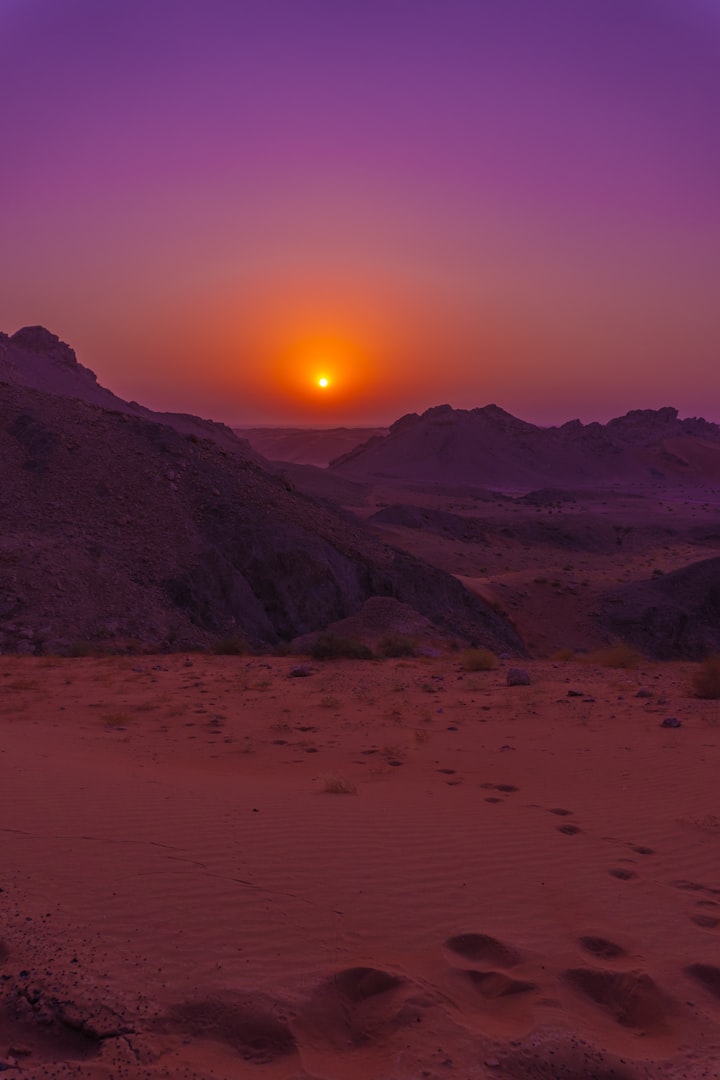
Izem Mokrani explained his desire to take a vehicle, out into the desert, to his coworker this way: “Because that’s where I intend to set the music free.”
He was always speaking like this, in ancient riddles: intending to perplex his fellow Martians, and amuse himself. That’s how he had seemed, to his work buddy-turned-driver, at their initial contact.
“What do you mean by that?” Orsolya Bokor asked, or semi-demanded, forcing herself to keep her eyes on the sandy terrain passing beneath the Sandcat she was driving. “Has it been in official custody, or something?”
Izem smiled at that, without offering response, which was so like him. He was just a contented passenger, bouncing a bit in his seat, as she piloted.
Dusk would soon commence, for this region of the planet Mars. When it did so, Izem intended to be in the middle of absolutely nowhere, and he had roped his work buddy into spending some of her calories to rent the Sandcat vehicle, get him there, and hope something musical happened.
She had a practical approach to life, in the world — whichever world it was she was on, at that moment. She found his somewhat… ethereal presence a bit of a task to ‘appreciate’.
Orsolya chalked it up to, Oh, he’s just a kid, being he was a lad of nineteen birthdays to her twenty-three, and he was also a legacy hire, the son of an established flight surgeon with a long record of service to the Organization — another privileged tyke, not a working stiff, like herself.
She had found him a bit annoying, when they first met, and more than a bit self-absorbed, always going on and on about music and mystic journeys, as if he knew the punchline of a really excellent joke and didn’t want to share it with anyone just yet.
Later, as she worked with him at Receiving Station Eight, it started to grow on her — unbelievable, almost.
As drivers within the facility, the friends learned their way around the Earth colony; they soon grew impatient for some diversion from their routine, on the fourth rock from the Sun, averaging forty-some million miles from the third.
New people arriving from Earth to the Orbital Platforms could be flustered — and demanding, always peppering her with questions: which way, to the crew quarters or the administrative offices, in the Central Operations Hub of the extraterrestrial village they called their current home; where to eat, to shop, to exercise.
Green Valley was not green, not like places on Earth were green, meaning of course, foliage — trees and grass and so forth, on its naked surface. Its eco-habitat, one of the largest structures in the colony, could boast of all sorts of transplanted foliage. Recently, a tree did not have to reach down into earth to reach down into soil…
The fruits of such trees grew courtesy of the Global Space Organization, the original non-governmental body that had pushed out the fledgling space- exploration efforts by competing countries, melding them at length into a single migration of humans, outward into our solar system.
Green Valley was the first successful, self-sustaining, off-Earth colony — and the GSO was hiring on new hands to keep it going. Whether it was recruiting Orsolya in Budapest, or Izem in Algiers, the GSO opened the portals of space to all kinds of folk.
^^^^
With its eight points of articulation, their Sandcat could be reconfigured to do a variety of jobs, ranging from hauling equipment to evacuating injured personnel. As its onboard power supply was limited, it was programmed not to exceed a limitation of distance — it could not drive its human riders too far away to return to base in time to avoid suffocation, nor could it be allowed to idle in the desert.
It was also programmed to return to the colony, on autopilot, once it had gone beyond its battery limit — even if the ‘concert’ ran overtime. No encores were to be encouraged.
“We’re there,” Izem said, suddenly, as if rousing himself from a nap. He tried to twist himself around, to face the back of the vehicle — in which his instrument was stored.
“Free at last,” joked Orsolya, hitting the idle button on her instrument board — she was only being a bit sardonic. Almost despite herself, she wanted to experience a music about which she had heard only tantalizing hints from its maker.
“I have been soaking up all of the greats,” Izem claimed to her, in an earlier and less charged atmosphere. “Great players, from as far back as the late nineteen-hundreds. A man named Hendrix, from England, I believe, and —or was he an American, too? Like this Texan — have I told you of Stephen Ray Vaughan?”
Orsolya had shrugged, trying to downplay her growing interest in the topic. “I can’t say I’ve ever heard of her.”
“You will. He is quite excellent. And from my own portion of paradise, Ali Farka Touré.” He hugged himself, warmed by the mention of their names, adding: “I can walk where they have walked in song, and where they have not walked — on Mars. It is an abundance of riches.”
“See, this is why we don’t hang out more often,” Orsolya teased. “You study the history, while I prefer to make some of my own, in the here and now.”
Izem had not taken offense. He told her of his ambition to transmit, from this lifeless expanse of reddish sand, a performance of his own song-cycle, which he wanted to call ‘Spend the Night’. “It’s like the darkness of the evening,” he marveled, “is almost a resource. Like food, or money.”
“Food is money, Izem,”she reminded him, with a faint smile. “Anyhow, what is a… ‘song cycle’?”
His eyes glittered with pleasure — she was taking an interest in his work. “It has to do with Damya, a great queen of the Berbers, who lived back in the seventh century. It was said she could divine men’s fortunes and alter the course of the world. We call her the al-Kāhina.” He shrugged, in an almost convincing effort to project modesty. “Well, that is what my song cycle is about.”
^^^^
They sealed their helmets and, clad in full environmental suits, stepped out to set up the ‘performing venue’: a balloon-like enclosure. Their suits were heavy on them, by design; the specific gravity of Mars had three-eighths the intensity of Earth’s. Humans native to the latter planet could experience bone-density loss and other health hazards, if too long in the lower gee field.
Then Izem grasped his instrument, an Arabian kitar, and warmed it up with a few practice chords. He set down a portable audio kit, working its controls to get every prerecorded rhythm track aligned, ready to play.
Izem leaned toward the holo-camera and mumbled a few words. “You will hear the song cycle I have written. This is the first song, Berber Horse —"
He missed Algeria, Orsolya knew. Most Martians she knew, or with whom she worked or socialized, missed their portion of Earth’s paradise, as Izem had put it. He commenced to play, and for the next hour or so, he was… different.
Izem swayed, playing his kitar with fingers that seemed to blur as they moved faster and faster against the strings. She found herself swaying from relentless percussion and his insistent foot-tapping; he was almost dancing as he played. It was enthralling, unlike anything she had heard; hypnotic, somehow —
“Polite alert,” a drab, artificial voice sounded in her helmet, from the waiting Sandcat’s dashboard. “Your turnaround time is in T minus five minutes —”
“Izem!” Orsolya barked, and she stood, bolt upright, with enough force that she almost fell backward, into the camera. “We have to pack up. The ‘cat will leave us here, if we don’t —”
Having just played two songs and part of a third with his eyes shut, Izem squinted at her.
“I am still in performance, Orsolya,” he said, as if it were reasonable to risk being left behind on the Martian surface, to die of asphyxiation, once their suits had exhausted their oxygen supplies. “I worked an extra shift back on Thorisday, to be able to come here today, on Rayday.”
“I bet they appreciate your sacrifice,” she granted, trudging across the red sand to open up the rear of the Sandcat. She had only to push a button, and Izem — with his musical and recording instruments — could find himself crushed, in a most unwelcome embrace, as the portable cabin deflated in haste.
“We can’t quit now,” Izam insisted. “Orsolya, we’re here to extract water, from this cold orb. That’s fine. It’s science, and we all owe so much to science — but, I also want to make art here. That’s how I extract water from Mars.”
She was working on a reasonable response to this, when their Sandcat lurched backward, spun on its right rear wheels, and headed off, over the ridge, on its way home to Green Valley, without either of them aboard.
“Well, that’s just great,” Orsolya hissed. Her helmet felt like a great burden on her head, as if it had suddenly, and unscientifically, gained weight on this tiny planet. “I hope you can compose a poetic signoff for us, because we just died.” She awaited the response he never gave. “Izem, are you even listening to — ”
Then she spied it: that speck of radiance, growing as it moved across the night sky, on approach to the surface of their temporary home world. She figured it must be another SBH-3 lander, delivering some new folks to the surface the rough way, a bounce at a time, protected by its array of airbags— ‘crude, but effective’.
Izem responded to this vision — by… still playing his kitar, one sustained, wailing note, until the rush of nitrogen-oxygen air bled out of the cabin to the extent that he was forced to step out from it. His Arabian instrument was silenced in Martian air, which was too thin, too toxic — nearly ninety-six percent of it was just carbon dioxide — and too cold for humans to breathe.
Izem stepped forward, to regard Osolya with a faint, strangely unworried, smile. She was about to work up the nerve to yell some kind of outrage, tell him just what she thought of his fool’s errand that had cost a pair of human lives, for what — a bit of music?
She didn’t hear, and almost didn’t see, the vehicles arriving from Green Valley, until they were almost upon her, and Izem. He waved to one of them, as it was slowing down to get a better look at them.
Orsolya pointed an accusing finger at him. “You knew they were coming!” she laugh-yelled at him. “That’s why you picked Rayday to do this… this.”
Izem feigned bafflement, but not very convincingly. “Orsolya, I sing about the Kahina,” he said. “I do not claim to possess her powers of fortune-telling. So, what do you think?” The door of one vehicle swung open. A suited person, of indeterminate identity, beckoned to them.
“Of the show?” Orsolya followed him back to the vehicle, one heavy step at a time. “It was most enjoyable, but I think the ending was my favorite part!”
© Eric Wolf 2021.
About the Creator
Eric Wolf
Ink-slinger. Photo-grapher. Earth-ling. These are Stories of the Fantastic and the Mundane. Space, time, superheroes and shapeshifters. 'Wolf' thumbnail: https://unsplash.com/@marcojodoin.






Comments
There are no comments for this story
Be the first to respond and start the conversation.